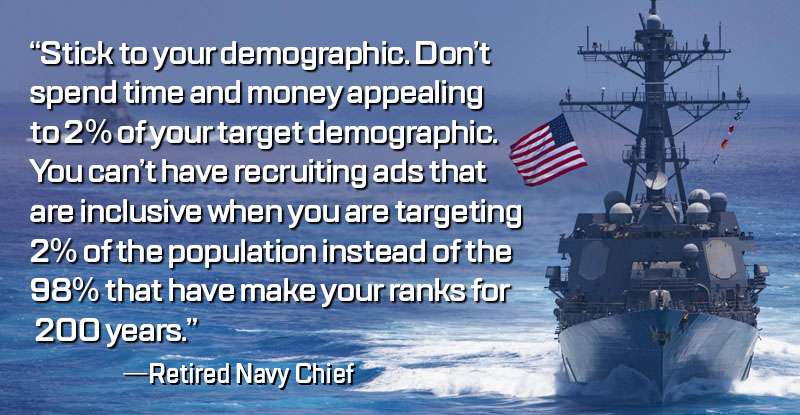It was a rough summer for drag queens, with uproars over public library story hours and bruising boycotts against Jack Daniel’s for promoting drag shows in its advertisements routinely making news.
Meanwhile, conservative across the country, as they prepared to vote in 2022 midterms, were expressing discomfort—and for some alarm—over what many saw as a seemingly-pugilistic promotion of transgender and LGBTQ+ rights, vowing to restore “normalcy,” if possible, with their ballots.
It was also a rough year for military recruiting. Of three of the U.S. military’s largest branches, only the Air Force met its 2022 recruiting goal. The Army missed by 15,000 and the Navy fell shy even after lowering its quota, increasing its enlistment age to 41, and relaxing other standards.
So when the Navy in October chose to promote a sailor who weekends as a drag queen as one of its social media “digital ambassadors” as part of its recruitment strategy, many questioned how the sea service—so reliant on signal intelligence—didn’t see all the blinking red lights, or hear all the bells, all the whistles, all warning this just might not be a good marketing idea.
As things turned out, the Navy did, in fact succeed in making Yeoman 2nd Class Joshua Kelley the face of a well-publicized campaign.
But instead of promoting Diversity, Equity, and Inclusion (DEI) as a recruiting tool, as the Navy apparently intended, YN2 Kelley became Congressional Republicans’ favorite poster prop in arguing that his celebration is why many young Americans—especially those among conservative constituencies—are turning away. . . . .
. . . .None of this makes sense, the Heritage Foundation panel said.
“Allowing individuals suffering from gender dysphoria—proven to be medically pre-disposed to severe anxiety and who attempt suicide at rates 10 times the general population—to enter service with no regard for consequences was reckless. It may have satisfied a campaign promise but at the expense of reduced military readiness,” the panel said.
A 2016 RAND Corp. analysis titled “Assessing the Implications of Allowing Transgender Personnel to Serve Openly” estimated there were about 2,450 transgenders in the 1.4 million active-duty force.
Of those, relatively few will seek to “transition,” RAND surmised, estimating that “each year, between 29 and 129 service members in the active component will seek transition-related care that could disrupt their ability to deploy.”
It projected health care costs for transgenders to amount to an additional $2.4 million to $8.4 million annually.
And still, none of this makes sense as a recruiting angle, Waltz told The Epoch Times. “I would love for them to present me data that shows there is a large body of transgender soldiers out there who want to join so much. Where is their data that documents that?”
Spoehr, a former Army Lieutenant General, said the military has been in the “leading bastion of societal change” since before President Harry Truman issued an executive order de-segregating the armed forces in 1948.
“Sometimes for good and sometimes for bad. Sometimes, they get ahead of society in implementing programs” before generally accepted, he said.
But that’s what’s happening here, Spoehr said. In this case, “clearly” DEI and transgender policies are “catering to political factions,” he said. . . . .
. . . . Passman said the Navy has a great story to tell and doesn’t need to target fringe communities to fill its ranks.
The mission is to “continue to move towards the best use of talent. I think the focus should be on opportunities for personal and professional growth. There is no better place to really come into yourself than service to your country,” he said.
“It gives them an opportunity to level the playing field,” Passman continued, “and understand what it means to be part of something greater than themselves.”
“Stick to your demographic,” Gagne said. “Don’t spend time and money appealing to 2-percent of your target demographic. You can’t have recruiting ads that are inclusive when you are targeting 2-percent of the population instead of the 98 percent that have make your ranks for 200 years.”
There are three types of people who “historically join the Navy,” he said, and that’s where the future Navy should be built.
They are: “People who want college money; people who want to get out of their [bad] situations, out of the hood or backwaters of Arkansas; and people who do it out of a sense of duty. You have to appeal to the more traditional, more conservative demographic [to recruit the latter].” . . . . (read more on Epoch Times)








Leave a Comment